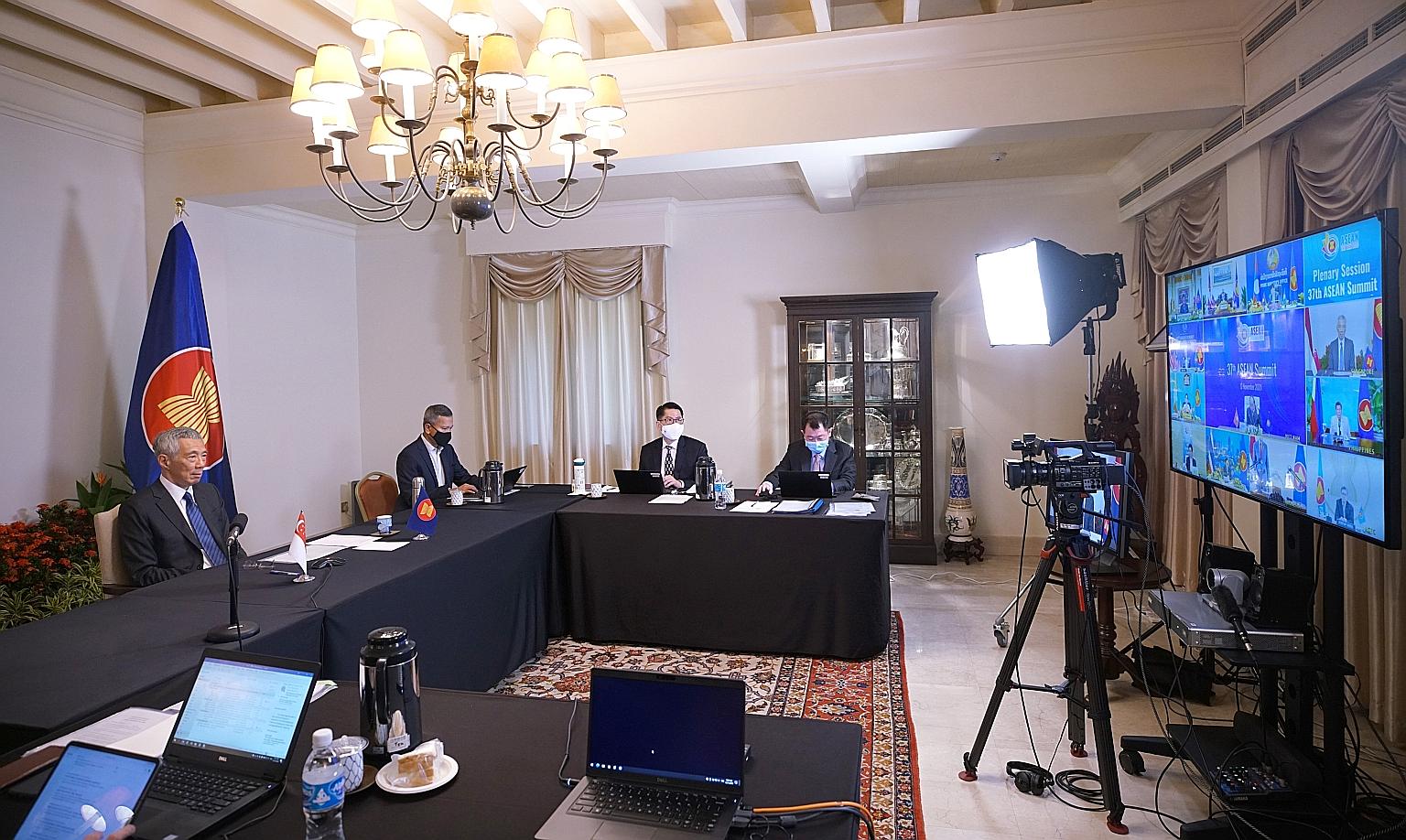Call for Asean, key partners to deepen economic ties
Maintaining connectivity will also help region bounce back after pandemic: PM
Sign up now: Get ST's newsletters delivered to your inbox

Prime Minister Lee Hsien Loong and Foreign Minister Vivian Balakrishnan (second from left) attending the Asean Summit via videoconference yesterday. As nations look towards the next stage of recovery, PM Lee said they must work together in the area of vaccine multilateralism to ensure an equitable, steady and affordable supply of vaccines and treatment.
PHOTO: MCI
Asean countries and their key partners should deepen economic cooperation and maintain connectivity to rebound from the Covid-19 pandemic, said Prime Minister Lee Hsien Loong yesterday.
He added that the conclusion of the Regional Comprehensive Economic Partnership (RCEP) trade deal - expected to be signed on Sunday - will reflect the commitment to "uphold a rules-based multilateral trading system and promote regional economic integration".
PM Lee and fellow Asean leaders attended four summits with key partners via videoconference as part of the 37th Asean Summit hosted by Asean chair Vietnam.
The Asean leaders met Chinese Premier Li Keqiang, Japanese Prime Minister Yoshihide Suga, South Korean President Moon Jae-in and Indian Prime Minister Narendra Modi.
At the Asean-China summit, PM Lee said partners like China have been steadfast in helping Asean fight Covid-19, even before the full scale of the pandemic was known.
"(We) worked together to maintain supply chains - and this has supported the region's efforts to contain the pandemic and fortify the resilience of our economies - as well as to repatriate our citizens and ensure the health and wellbeing of our populations," he said.
As nations look towards the next stage of recovery, PM Lee said they must work together in the area of vaccine multilateralism to ensure an equitable, steady and affordable supply of vaccines and treatment.
He welcomed Chinese President Xi Jinping's commitment to make vaccines a public good and prioritise the needs of the region, as well as China's participation in the Covax Facility, which he said reflects its close relationship with Asean.
The facility is a global initiative that brings together governments and manufacturers to ensure eventual Covid-19 vaccines reach those in greatest need.
PM Lee also welcomed China's contribution to the Covid-19 Asean Response Fund as well as its move to earmark US$5 million (S$6.7 million) from the Asean-China Cooperation Fund for a public health cooperation programme.
At the Asean-South Korea summit, PM Lee said strengthening economic cooperation would help in the countries' recovery.
The work to update the Asean-South Korea Free Trade Area will help businesses cope with the pandemic's impact and create more growth opportunities, he added.
On enhancing connectivity, he highlighted the need to maintain open and connected supply chains so trade flows - including of essential supplies such as food and medical equipment - are not impeded.
"We should also consider how we can progressively and safely lift travel restrictions while instituting suitable public health and safety protocols," he said.
The Asean-Japan summit, which was Mr Suga's first, saw the launch of the Asean Centre for Public Health Emergency and Emerging Diseases - a hub to develop countermeasures against the threat of infectious diseases.
PM Lee said Japan has also contributed to Asean's Covid-19 initiatives through consistent engagement and economic pacts.
He also thanked Japan for its role in bringing the RCEP to "fruition" and pushing it forward "every step of the way".
The RCEP, which will be the world's largest trade pact, involves 15 countries: Asean's 10 member states, as well as China, Japan, South Korea, Australia and New Zealand. Together, they contribute about one-third of the world's gross domestic product.
Negotiations involving 16 countries were launched in 2012, but India withdrew from the deal last year, citing concerns that the elimination of tariffs would open its markets to a flood of imports.
At the Asean-India summit, PM Lee said: "We understand India's decision not to sign the RCEP at this time. But Singapore stands ready to welcome India to the RCEP, whenever it is ready to re-join."
PM Lee said Covid-19 has emphasised the importance of Asean strengthening its strategic partnership with India, including in research and development for vaccines and treatments for the virus.
India, he noted, is a key player in the global pharmaceutical supply chain and has deep technological and biomedical expertise.
PM Lee added: "I hope we can work together to bring new medical solutions to the market quickly, and to facilitate their equitable, steady and affordable supply."


